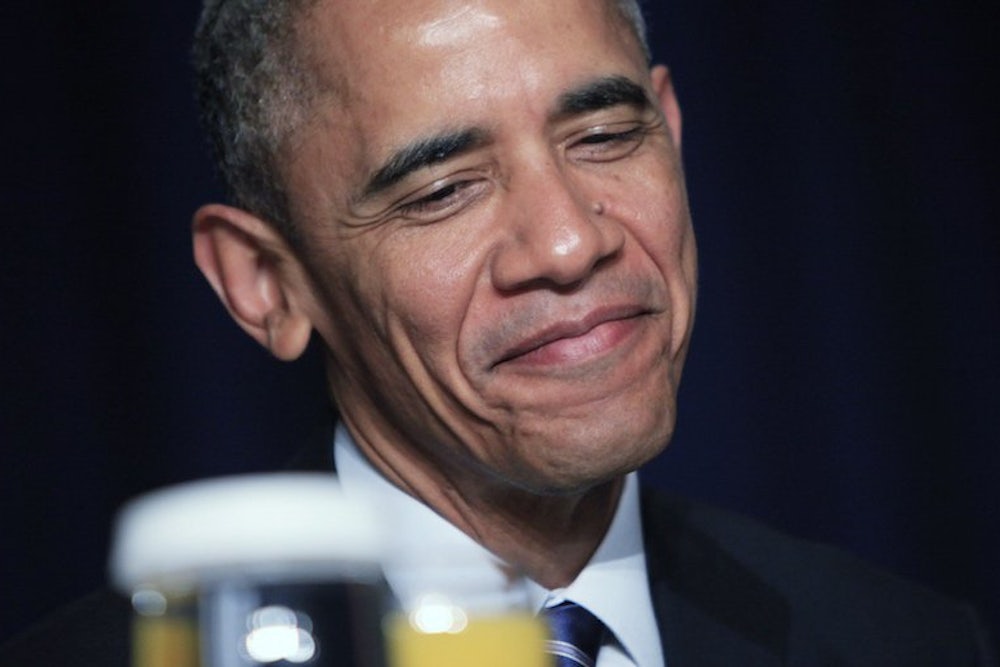Conservative critics are in hysterics thanks to a few short remarks made by President Barack Obama on the subject of Christian history during Thursday’s National Prayer Breakfast. Addressing religiously motivated conflict abroad, Obama said, “Humanity has been grappling with these questions throughout human history. And lest we get on our high horse and think this is unique to some other place, remember that during the Crusades and the Inquisition, people committed terrible deeds in the name of Christ. In our home country, slavery and Jim Crow all too often was justified in the name of Christ.”
Naturally, conservatives were displeased with the suggestion that Christianity might be in some sense comparable to contemporary religious terrorism. At RedState, a contributor adduced Obama’s comments as further evidence of the president’s alleged fondness for Islam, while Rush Limbaugh interpreted the remarks as an insult to Christianity and a defense of radical Islam. Former Virginia Governor Jim Gilmore said, “The president’s comments this morning at the prayer breakfast are the most offensive I’ve ever heard a president make in my lifetime,” adding that Obama "has offended every believing Christian in the United States. This goes further to the point that Mr. Obama does not believe in America or the values we all share.”
Critics who viewed Obama’s speech as a bold defense of Islam seem to have missed the segment wherein he labeled the Islamic State a “vicious death cult,” and offered its horrific acts of terrorism as evidence of the evil that can be done in the name of (admittedly distorted) faith. The example of past Christian atrocities was given only to counterbalance the reproach aimed at religiously motivated violence committed outside the Christian world; it was not a stand-alone condemnation, and further, it did not go nearly as far as it could have.
By limiting his criticism of Christian violence to the Crusades and Inquisition, Obama kept his critique of Christian horrors to centuries past. But one need not look back so far to find more recent Christians behaving terribly in the name of Christ. The atrocities of the Bosnian War, including the systematic rape of women and girls, was perpetrated largely by Christians against Muslims; meanwhile, many of the Christian churches of Rwanda were intimately involved in the politicking that produced the genocide of 1994, with some clergy even reported to have participated in the violence.
The degree to which, in retrospect, we are willing to condemn violent perversions of faith often has to do with their proximity to us. Most will now admit, however grudgingly, that the Crusades and Inquisition were efforts to carry out some construal of God’s will, however mistaken and otherwise motivated. With more recent conflicts, such as Bosnia and Rwanda, we are more apt to see Christianity as a single thread in a web of ethnic and political tensions that was ultimately only one cause among the many that ultimately culminated in brutality. And this analysis is probably right.
But it is also probably true of the terrorism perpetrated by ISIS, which has been roundly denounced as contrary to the principles of Islam by a host of Muslim leaders and clerics, most recently after the murder of Jordanian pilot Moaz al-Kasasbeh. Like war crimes and individual acts of brutality committed within the Christian world, the pattern of tensions that has produced ISIS, in all its unthinkable cruelty, seems to be broader and deeper than its self-proclaimed religious convictions. For those not searching for a source of personal offense, this is the only point Obama’s remarks on the religious violence enacted by Christians really conveys.
And it is, at last, a hopeful point: If we in the Christian world are capable of owning the monstrosities of our past, identifying their sources as multivalent and contrary to our faith, and holding one another accountable for the behavior we exhibit moving forward, then so are the members of the faiths we live alongside in the world. But accountability requires honesty, and pretending that Christians have never attributed violence to the cause of Christ is a disservice to modern peacemaking and to the victims of the past. Obama was right to take a clear-eyed view of the years that have come before, and to look hopefully to what we can do together as a multi-faith nation in the years to come.
